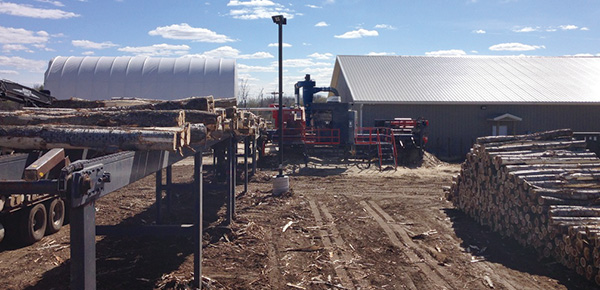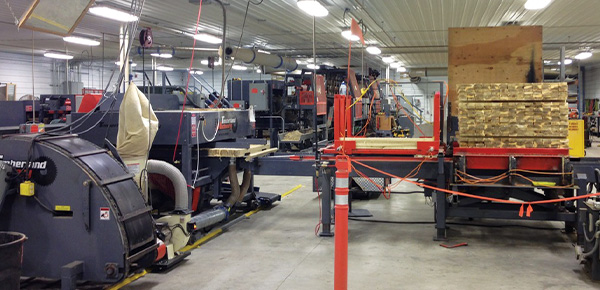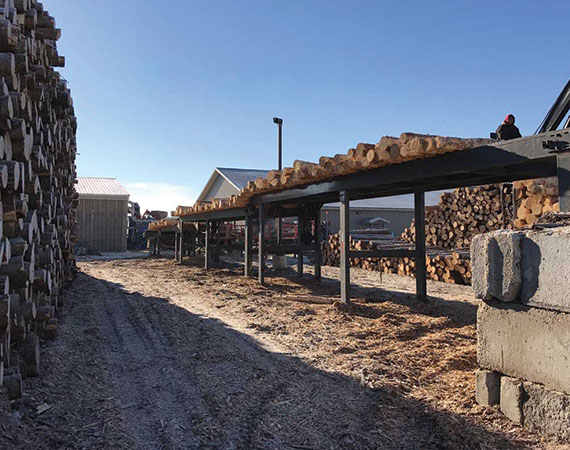On Memorial Day 2012, an explosion and fire destroyed the Verso Paper Sartell Mill and killed one worker. Five months later, the Frey family — Mike Frey and his children Michael, David and Sara — closed a deal to purchase more than 15,000 acres of tree farmland from Verso that included 4.5 million trees meticulously planted every 10 feet.
“It was a big lift,” Michael Frey says. “There really wasn’t a playbook for how to do this on this scale. If you had 80 or 100 acres of these trees, you’d probably cut them all down, dig up the stumps, burn them and be done in a few weeks. Well, we had that times 120. There were some days that we thought, ‘What the heck did we get ourselves into?’”
Yet, in less than a decade, the Freys successfully transformed the acreage into rentable farmland.
The family hired contractors to harvest the timber, including Dick Walsh Forest Products out of Park Rapids, which was the linchpin of the operation over the years.
Berkness Sawmills in Clotho suggested using the timber for pallet lumber. They teamed up for a short while, with Berkness custom cutting the logs and the Freys selling the lumber on the open market. In late 2013, the Freys decided to build their own mill on an 18-acre site that Verso had used as a wood yard with an equipment shed.

The family hired a Bemidji-based milling industry consultant, toured plants in Missouri and Pennsylvania, and did plenty of research before constructing their sawmill. They hired a plant manager and a temp staffing agency and cut their first logs in September 2014.
In March 2016, Mike Frey resigned his executive management role in the company. Michael bought out his siblings in January 2020 to gain full ownership of Maverick Wood Products, which today is a thriving 24-person sawmill in Browerville that produces rough green lumber for pallet, crate, and skid producers across the Midwest.
“In January 2020, we finished cutting all of our own wood,” Frey says. “The last two years, we’ve been purchasing wood on the open market.”
Despite having no knowledge of the milling industry less than a decade ago, Maverick Wood Products has become the career Frey didn’t know he wanted until the opportunity presented itself. Now his focus is on its growth and maximizing efficiency in his company. While demand plummeted from March to July 2020 due to the pandemic, the phone started ringing again the last week of July that year and hasn’t stopped since.
“It’s been two years of crazy demand,” says Frey, who distributes products as far away as Arkansas. “From August 2020 on we’ve ridden the wave of strong lumber pricing.”
Frey connected with Enterprise Minnesota business development consultant Dave Kvasager and consulting expert Greg Hunsaker to help generate ideas that would reduce downtime and increase output.
The Enterprise Minnesota team recommended a 2½ day Total Productive Maintenance (TPM) implementation — a rapid improvement event focusing on production equipment, including maintenance, enhancements and employee training.

“It gets the operators involved in maintaining their own equipment and emphasizing initiative-taking and preventative maintenance,” Kvasager says.
Frey says TPM will improve margins by increasing flow, production, and efficiency, as well as reducing lead times.
“When you’re selling lumber, which is a commodity, there’s not much we can do to differentiate ourselves. We need to be a low-cost producer,” Frey says. “I’m always looking at how we can do better.”
Initially, Frey is focusing on the “low-hanging fruit” of growth opportunities by improving the equipment and systems already in place. He is attacking and fixing the root causes of why a particular machine center has to stop because, say, a bent framework prevents the wood from sliding down correctly.
“That could take someone maybe half an hour on a Friday to torch out a bent piece of steel. We eliminate the root cause of the downtime, and we’ve spent almost nothing on it,” he says.
Frey envisions growth options might include adding a second shift, investing in new equipment, or even building a larger facility down the line.
“For now, I’m focused on, ‘How do we shove more wood through this place?’” he says. “If we’re at 3,000 logs per day, then how do we get to 3,300? I look at TPM as our first bucket.”
Frey also attends the monthly Enterprise Minnesota peer councils in Alexandria, where CEOs gather to introduce questions and issues they’re facing and receive help from others who have faced similar challenges. He recommends them to anyone in the manufacturing industry.
“Those are a 10 out of 10. I really look forward to them,” he says.
…
Featured story in the Winter 2022 issue of Enterprise Minnesota magazine.


